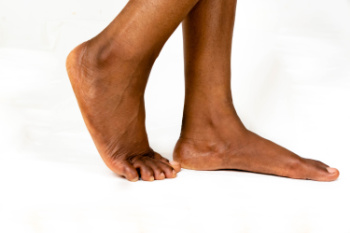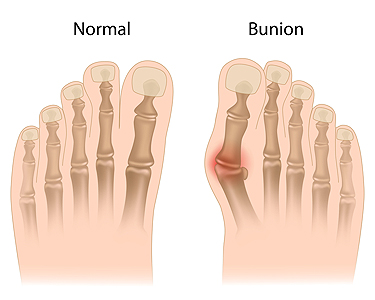Items filtered by date: June 2025
Managing a Dislocated Toe

A dislocated toe occurs when the bones in a toe joint are forced out of alignment, often from a sudden impact, twist, or fall. This injury is common in sports and activities that involve jumping or quick direction changes. Symptoms include sharp pain, swelling, bruising, difficulty moving the toe, or a visible deformity. In some cases, a dislocation can occur along with a fracture. A podiatrist will examine the toe and confirm the injury with an X-ray to assess the position of the bones and check for any breaks. If the bones are out of place, a podiatrist may perform a closed reduction, a process that involves gently guiding the bones back into position. If the injury is more severe, surgery may be needed to restore joint alignment. Stabilization methods, such as splints or supportive footwear, may be used during recovery. If you are experiencing toe pain due to an injury or possible dislocation, it is suggested that you schedule an appointment with a podiatrist for an exam and appropriate treatment options.
Toe pain can disrupt your daily activities. If you have any concerns, contact one of our podiatrists of Nashville Family Foot Care. Our practitioners can provide the care you need to keep you pain-free and on your feet.
What Causes Toe Pain?
Most severe toe pain is caused due to a sports injury, trauma from dropping something heavy on the toe, or bumping into something rigid. Other problems can develop over time for various reasons.
Toe pain can be caused by one or more ailments. The most common include:
- Trauma
- Sports injury
- Wearing shoes that are too tight
- Arthritis
- Gout
- Corns and calluses
- Hammertoe
- Bunions
- Blisters
- Ingrown toenails
- Sprains
- Fractures (broken bones)
- Dislocations
When to See a Podiatrist
- Severe pain
- Persistent pain that lasts more than a week
- Signs of infection
- Continued swelling
- Pain that prevents walking
Diagnosis
In many cases the cause of toe pain is obvious, but in others, a podiatrist may want to use more advanced methods to determine the problem. These can range from simple visual inspections and sensation tests to X-rays and MRI scans. Prior medical history, family medical history, and any recent physical traumatic events will all be taken into consideration for a proper diagnosis.
Treatment
Treatments for toe pain and injuries vary and may include shoe inserts, padding, taping, medicines, injections, and in some cases, surgery. If you believe that you have broken a toe, please see a podiatrist as soon as possible.
If you have any questions please feel free to contact our office located in Nashville, TN . We offer the newest diagnostic tools and technology to treat your foot and ankle needs.
Get Proper Treatment for Ankle Injuries
Risk Factors and Symptoms of Ankle Sprains

An ankle sprain occurs when one or more ligaments in the ankle are stretched or torn due to a sudden, forceful movement beyond the joint’s normal range. This is often the result of twisting the ankle during sports or walking on uneven surfaces. The most common ankle sprains involve the lateral ligaments on the outer ankle. Risk factors include a previous ankle sprain, poor muscle strength, and impaired balance. Symptoms may include sharp pain when weight bearing, swelling, bruising, and instability. Some people also experience numbness or tingling if a nerve is affected. High ankle sprains, which injure the ligaments between the leg bones connected to the ankle, typically result from forceful twisting and can be more difficult to recover from. A podiatrist can evaluate the injury using clinical tests and imaging, recommend the appropriate treatment based on severity, and discuss long-term care to prevent further injury. If you believe you have sprained an ankle, it is suggested that you schedule an appointment with a podiatrist for appropriate treatment.
Ankle sprains are common but need immediate attention. If you need your feet checked, contact one of our podiatrists from Nashville Family Foot Care. Our practitioners can provide the care you need to keep you pain-free and on your feet.
How Does an Ankle Sprain Occur?
Ankle sprains take place when the ligaments in your ankle are torn or stretched beyond their limits. There are multiple ways that the ankle can become injured, including twisting or rolling over onto your ankle, putting undue stress on it, or causing trauma to the ankle itself.
What Are the Symptoms?
- Mild to moderate bruising
- Limited mobility
- Swelling
- Discoloration of the skin (depending on severity)
Preventing a Sprain
- Wearing appropriate shoes for the occasion
- Stretching before exercises and sports
- Knowing your limits
Treatment of a Sprain
Treatment of a sprain depends on the severity. Many times, people are told to rest and remain off their feet completely, while others are given an air cast. If the sprain is very severe, surgery may be required.
If you have suffered an ankle sprain previously, you may want to consider additional support such as a brace and regular exercises to strengthen the ankle.
If you have any questions please feel free to contact our office located in Nashville, TN . We offer the newest diagnostic and treatment technologies for all your foot and ankle needs.
Causes and Treatment Options for Flat Feet

Flat feet, also known as fallen arches, occur when the arch of the foot collapses, causing the entire sole to make contact with the ground. This condition can be present from childhood or develop over time due to aging, injury, obesity, or conditions like arthritis. People with flat feet may experience foot pain, especially in the arch or heel, along with swelling, fatigue, or an uneven gait. Some may also feel pain in the knees, hips, or lower back due to improper alignment caused by poor foot structure. A podiatrist can diagnose flat feet through a physical exam, gait analysis, and imaging studies if needed. Treatment includes custom orthotics to support the arch, targeted exercise, supportive footwear, or activity modifications. In severe cases, surgery may be considered to correct the structural issues. If you have issues related to your flat feet, it is suggested that you are under the care of a podiatrist who can help you to manage your foot health.
Flatfoot is a condition many people suffer from. If you have flat feet, contact one of our podiatrists from Nashville Family Foot Care. Our practitioners will treat your foot and ankle needs.
What Are Flat Feet?
Flatfoot is a condition in which the arch of the foot is depressed and the sole of the foot is almost completely in contact with the ground. About 20-30% of the population generally has flat feet because their arches never formed during growth.
Conditions & Problems:
Having flat feet makes it difficult to run or walk because of the stress placed on the ankles.
Alignment – The general alignment of your legs can be disrupted, because the ankles move inward which can cause major discomfort.
Knees – If you have complications with your knees, flat feet can be a contributor to arthritis in that area.
Symptoms
- Pain around the heel or arch area
- Trouble standing on the tip toe
- Swelling around the inside of the ankle
- Flat look to one or both feet
- Having your shoes feel uneven when worn
Treatment
If you are experiencing pain and stress on the foot you may weaken the posterior tibial tendon, which runs around the inside of the ankle.
If you have any questions please feel free to contact our office located in Nashville, TN . We offer the newest diagnostic and treatment technologies for all your foot and ankle needs.
Bunions and Their Causes

A bunion is a bony bump that forms at the base of the big toe, causing the joint to stick out as the tip of the toe leans toward the others. Symptoms often include swelling, pain, redness, and difficulty wearing certain shoes. Bunions develop over time due to pressure on the joint, often caused by improper footwear, inherited foot structure, or arthritis. Risk factors include wearing narrow shoes, standing for long periods, and a family history of bunions. A podiatrist can evaluate the severity of the bunion, recommend supportive footwear, provide custom orthotics, and offer treatment options to reduce pain, improve alignment, and prevent the condition from worsening. If you notice the beginning signs of a bunion developing, it is suggested that you consult a podiatrist who can offer effective relief and treatment solutions.
If you are suffering from bunions, contact one of our podiatrists of Nashville Family Foot Care. Our practitioners can provide the care you need to keep you pain-free and on your feet.
What Is a Bunion?
A bunion is formed of swollen tissue or an enlargement of boney growth, usually located at the base joint of the toe that connects to the foot. The swelling occurs due to the bones in the big toe shifting inward, which impacts the other toes of the foot. This causes the area around the base of the big toe to become inflamed and painful.
Why Do Bunions Form?
Genetics – Susceptibility to bunions are often hereditary
Stress on the feet – Poorly fitted and uncomfortable footwear that places stress on feet, such as heels, can worsen existing bunions
How Are Bunions Diagnosed?
Doctors often perform two tests – blood tests and x-rays – when trying to diagnose bunions, especially in the early stages of development. Blood tests help determine if the foot pain is being caused by something else, such as arthritis, while x-rays provide a clear picture of your bone structure to your doctor.
How Are Bunions Treated?
- Refrain from wearing heels or similar shoes that cause discomfort
- Select wider shoes that can provide more comfort and reduce pain
- Anti-inflammatory and pain management drugs
- Orthotics or foot inserts
- Surgery
If you have any questions, please feel free to contact our office located in Nashville, TN . We offer the newest diagnostic and treatment technologies for all your foot care needs.

